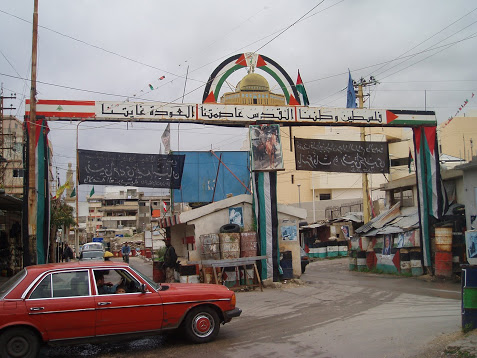Palestinian Faction Wars in Lebanon
An-Nahar, Lebanon, August 4
The clashes occurring in the Ain al-Hilweh Palestinian refugee camp between the Fatah movement and a host of Islamic organizations represent a disagreement that runs much deeper than a mere struggle for influence or control of certain areas. Such strife has far-reaching implications which extend to the internal Palestinian dialogue that took place in Cairo, especially between the Palestinian Authority and Hamas. The assassination of a senior Fatah commander, Abu Ashraf al-Armoushi, sent shockwaves through the Fatah movement. According to senior officials in Lebanon, the clashes in the camp erupted after Palestinian intelligence chief Majed Faraj visited Beirut, where he met with high-ranking officials in government. The Palestinian Authority is aiming to consolidate its control over the Palestinian refugee camps in Lebanon, in an effort to foil Hamas’ attempts to overtake them. Clashes at the camp this time around differ from previous rounds in that they do not seem to culminate in a cease-fire agreement. Rather, they could pave the way to further violence, most notably the Fatah movement’s demise. This disorder not only disrupts the Palestinian political scene but also has ramifications for the Lebanese internal and external political situation. It may even revive the call to disarm the Palestinian factions, while the Lebanese army is drawn into battles in which it should remain uninvolved. Meanwhile, the arms kept outside the camp by smaller Islamic organizations are mobilized to further the strategy of consolidating the frontlines against Israel. It was alarming that the cease-fire in the camp was broken more than once, raising questions about the parties’ attempts to stoke the situation for their own benefit. The developments on the ground show that all Islamic organizations have teamed up against the Fatah movement, rendering it unable to make any advances. Despite its inability to resolve the conflict militarily, Fatah made attempts to restrain Islamic forces to certain parts of the camp, responding with force to any attacks against them. If the Islamic forces, including extremist organizations, can weaken the Fatah movement, they will transform the camp into a breeding ground for ISIS, al-Qaida, and other extremist entities. It is impossible to gauge precisely what the reality within Ain al-Hilweh camp will look like so long as there is no shift in the balance of power within it and unless the internal Palestinian developments at home manifest in the lives of the Palestinian refugees abroad. However, it is clear that the external forces striking at the Fatah movement with the assassination of one of its leaders have inflicted a crippling blow, and further losses are to be expected, should the movement remain unable to make any meaningful progress. The atmosphere in Palestinian refugee camps has long been tense, made all the more so by intensifying internal disputes and external meddling. Lebanon, as well as regional powers, appear to be trying to prevent any rapprochement between Palestinian factions. In order to do this, these forces are supporting organizations that have been sidelined in Palestinian reconciliation negotiations in order to have stronger control over the camps. This is seen as an attempt to hold back the Fatah movement, weaken Palestinian solidarity, and create a new political reality. There are also groups who are trying to push the Palestinians and Lebanese into a conflict. It is an agenda that seeks to use the Lebanese army to fight a bogus battle of disarmament, exploiting the fact that the Lebanese forces benefit from a state of tension. The Palestinian refugee camps in Lebanon are poised to become a focal point of tension in the coming period, with the potential danger of extremist groups gaining control of the camps under regional support. This would place both Lebanese and Palestinian citizens at risk. —Ibrahim Haider (translated by Asaf Zilberfarb)


